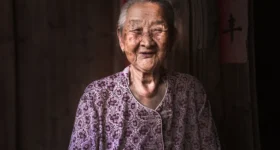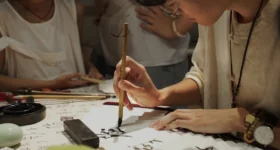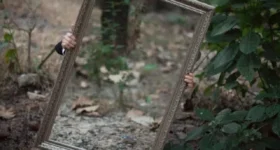
candidphoto13.jpg
It had been five years since the American branch of the family returned to visit, so the
uncles and aunts pooled their money and hired professional photographers to capture the night.
Each person was dressed in New Year clothing even though it was the middle of summer. You
could almost smell the fortune through the photo, laced with the aroma of Grandma’s mushroom
and bamboo shoot soup. The sharp rawness of fresh meat wafted from the kitchen corner where
the great-aunts, seated around a round table, were making dumplings with plump pork filling and
thin wrappings.
Dinner took place in the basement. The dining table was there, after all. It hadn’t moved
since it was first placed there thirty years prior, not even when the first floor was built, nor the
second, nor the third. Now the house had five floors, yet the dinner table remained in the
basement, surrounded by faded photos on grain shelves and baskets of prepared food hanging
from the ceiling to prevent rats from getting into them. There were refrigerators, of course— two
in fact, the other was on the fifth floor— but sometimes old solutions worked better.
There was one candid in particular that captured that evening’s real energy. On the far left
of the photo is a narrow window, almost completely covered in cookware hung above a small
sink. The tiny space beneath the staircase leading up to the garage floor was where all the
cooking happened. Water from the pipes, which stubbornly remain leaky after multiple repairs,
dripped into a giant bucket that Grandpa would set out at night, collect and dump for the
chickens in the morning, and repeat.
The family’s two dogs are outside, appearing as underexposed shadows. Their eyes shine,
snouts pressing into the mosquito screen door that separates the basement and the courtyard. The
courtyard wasn’t theirs. It belonged to the neighboring mansion. Derelict and mostly abandoned
now, it had been seized by the government during the Communist Revolution and distributed
among fourteen poor families, one room each. Great-grandma’s family was one of them.
Great-grandma herself is nowhere to be seen in the photo, still napping inside the landlord’s
mansion. She was the only one who continued to live there despite its crumbling infrastructure,
in rejection of the new house and all its modern amenities. The family had no argument to
convince her to move since she was 96 and in great health.
Grandpa is a blur beyond the kitchen window, bent over the outdoor sink. He’s wearing a
dark red shirt and a pair of tan, traditional farming trousers. His gray head merges into the
evening light. In his hands are a batch of freshly harvested vegetables, homegrown.
On the first floor, the garage floor, more cousins and aunts are arriving, padding down the
basement stairs in their Nikes and Crocs. The uncle in the very front, who evidently didn’t get
the dress code given the Hawaiian shirt he’s sporting, extends his arms to no one in particular.
Three reuniting sisters follow behind the first uncle, trailed by their children. All of the women
had hidden several red packets to be gifted to the youth after dinner. They contained several
hundred yuan each, some over a thousand. It was a special occasion— even if they weren’t so
well off, how could they dare to be stingy tonight?
In the center of all the mayhem is a girl. She looks out of place. While everyone else
weaves around her, she sits on an old bench like a lost child at a subway station. She’s wearing
ripped jeans and a tank top— the only person purposefully not in red. She’d never liked that
color and she grew out of her last set of New Year’s clothing eons ago. Her foreign attitude
wards off the boisterous anarchy that defines any functional, extended Chinese family.
The girl’s father stands next to his older brother, who he hasn’t seen in five years. But
he’s looking at his phone, not his brother, brows furrowed in contemplation. Overseas, he’s a
successful real estate broker. His beer belly is more prominent than the other men in the room.
The girl’s mother hunches over a pot, learning how to make Fu-Jian beef noodles from
Grandma. She has an exaggerated yet natural smile on her face, nodding to each syllable the
elderly woman says.
The girl’s indirect cousins occupy their own hangout spot next to the Moutai shelf.
They’re playing word games and discussing viral trends on Douyin. The oldest cousin is walking
towards the girl with two glasses of plum juice. It wouldn’t do to have a guest sit alone. The
cousin is a guest himself, coming home after three years away in college in Shanghai. He cuts a
tall, wiry figure, earned by late hours hunched over books. He wears square glasses— It
would’ve been strange if he wore none.
The girl’s younger cousin, barely in middle school, also wears glasses. With a slumped,
begging gesture, he trails after his mother as she navigates the crowded basement to bring a
batch of sweet wormwood pancakes— his favorite food— to the kitchen to be diced and
arranged. Another plate to add to the table which is already three quarters full.
The girl is staring into space. What is she thinking about? With that look on her face, it’s
as if she’s a stranger. Perhaps she feels that way, but even strangers can be family. This feast was
organized to celebrate her and her parents’ return, after all.
The girl’s eyes alight on a familiar, plastic fortune cat perching on a far shelf. It’s painted
gold, with squinting, smiley eyes.
The cat recognizes her too. Its raised paw beckons the girl, as if saying, “Where in the
world were you? It’s been so many years. Welcome home.”













Leave a Comment